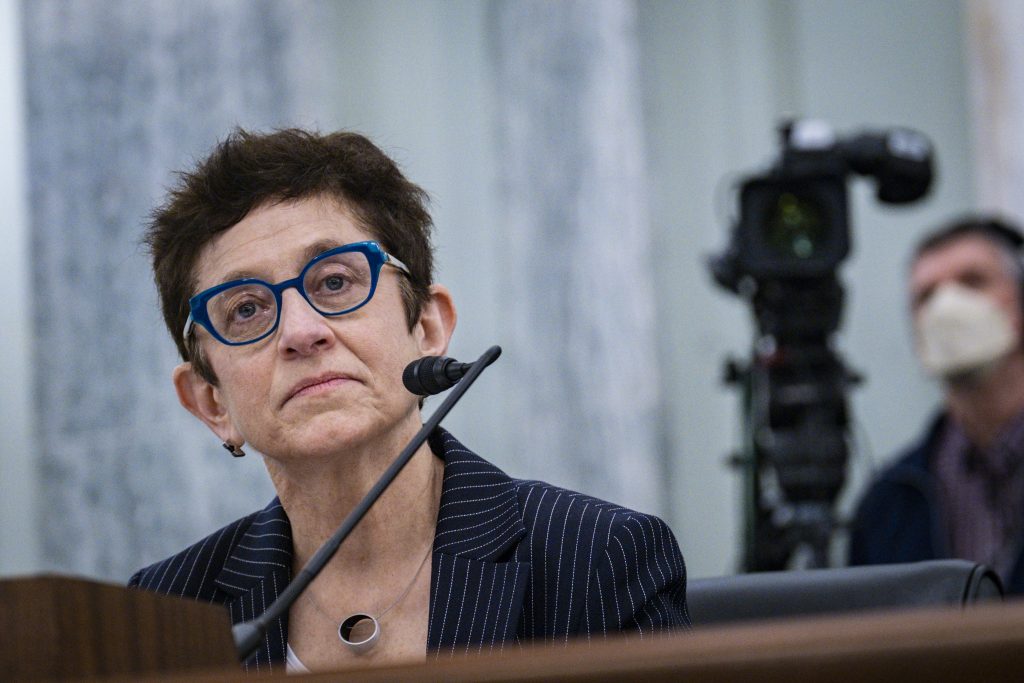A conservative advocacy group leading the effort to torpedo top Biden administration nominees has failed to disclose some spending on political ads, a move experts say could complicate its tax-exempt status.
The organization, the American Accountability Foundation, reported no spending on lobbying or advertising in 2021 and 2022, according to filings obtained through ProPublica’s nonprofit database and shared with POLITICO by the liberal-leaning watchdog group Accountable.US. But ad spending data shows AAF has spent hundreds of thousands of dollars to promote its research attacking President Joe Biden’s nominees, from a Supreme Court justice to agency leaders, even publicly cheering its own success when a campaign culminated in a nominee’s withdrawal.
“Those dollars seem to be left off of the form,” said Philip Hackney, a law professor at the University of Pittsburgh focused on nonprofits. “That’s a real issue.”
What the IRS considers to be lobbying, tax experts emphasized, is largely ambiguous. But the agency has taken the position that supporting or opposing candidates requiring Senate confirmation is lobbying, said Ellen Aprill, professor emerita at Loyola Marymount University. And if the IRS deems a group such as AAF has conducted too much of that political activity, it could issue a penalty or, for particularly egregious behavior, put its tax exempt status at risk.
The agency does appear to be investigating the matter, based on correspondence AAF made public revealing an IRS audit for 2021. In its scrutiny of AAF’s 2021 tax filing, the IRS requested, among other materials, a “Breakdown of the $65,000 paid in media fees and the specific issue(s) that were being addressed for each media fee that was paid.”
The foundation did not respond to requests for comment. In fundraising appeals, it has called the audit a “politically motivated IRS investigation.” Republican Senators have also accused the agency of weaponizing its power by auditing the conservative nonprofit.
For 2022, AAF — which calls itself a “government oversight and research organization” — disclosed that it spent $136,028 on media fees and unspecified “Fees for services.” However, according to data obtained by the ad analytics company AdImpact, AAF spent over $230,000 on Meta ads alone that year to oppose Biden’s FCC nominee, Gigi Sohn. Data from Meta also confirms that the ad spending to target Sohn in 2022 was around that figure. That figure does not include other means of advertising, nor does it include spending on other issues.
This spending did not appear to be included in AAF’s budgeting figures for other categories. Another entity could have made those buys on AAF’s behalf, but it did not disclose details of any such transactions with related groups.
When Sohn’s nomination was withdrawn in March of last year, AAF celebrated that it had spent hundreds of thousands of dollars on billboards and newspaper and digital ads to secure the result.
Sohn said the group was central to the demise of her nomination, particularly by spreading what she called the outlandish story that she was a “cop-hating partisan leftist.”
“They spent some serious money going into these particular states with vulnerable Democrats to create this narrative of me that was just completely false,” Sohn said, pointing to a billboard around the Las Vegas Strip attacking her nomination. The fact that AAF only goes after Biden nominees, she added, “sounds like partisan politics to me.”
During Supreme Court nomination hearings for Ketanji Brown Jackson, AAF published opposition research that circulated in conservative media and prompted a conspiracy theory, promoted widely within the QAnon community, that Jackson was sympathetic to sexual predators.
Among its campaigns, AAF also has lobbied Republican congressional offices to blacklist former Hill staffers who worked on the Jan. 6 committee, and it has co-sponsored a number of conferences for Hill staffers on congressional oversight and research.
The group started as a spinoff of the Donald Trump-allied Conservative Partnership Institute and shares funding and resources among a network of conservative entities, some of which lack both its tax benefits and transparency requirements. Tax experts say this allows AAF to take advantage of a system that allows so-called dark money groups to obscure their finances.
It was launched in 2020 by Tom Jones, who is listed on a CPI annual filing as a director. IRS filings for CPI and the America First Legal Foundation, founded by former Trump adviser Stephen Miller, list both groups as a “Direct controlling entity” for AAF. In 2021, more than 60 percent of AAF’s reported spending was on compensation for Jones and one other top employee.
CPI also helped create two corporate entities, Compass Professional and Compass Legal, that its annual report said could be used to outsource human resources, accounting and legal services. Both corporations are run by former Trump administration officials, one of whom is the brother of CPI’s president and CEO.
Although AAF did disclose in its filings that it shared resources with affiliated entities, the documents do not provide many details on those transactions, specifically what resources or services were shared. CPI, whose leaders include former Trump chief of staff Mark Meadows, reported giving around $530,000 to AAF in 2021 and 2022, about 40 percent of AAF’s total contributions over those two years.
CPI also reported more than $1 million to Compass Legal and about $949,000 to Compass Professional in 2022.
CPI did not respond to a request for comment.
AAF’s connections to such groups limit visibility into its finances, said Brian Mittendorf, a professor of accounting at Ohio State University. And the corporate entities affiliated with the nonprofit appear to exist as a sort of clearinghouse for shared services, he added.
“Best-case scenario,” Mittendorf said, ”we lose out on transparency. Worst-case scenario is you have to start worrying about conflicts of interest and organizations who aren’t allowed to use funds for political purposes doing so.”







